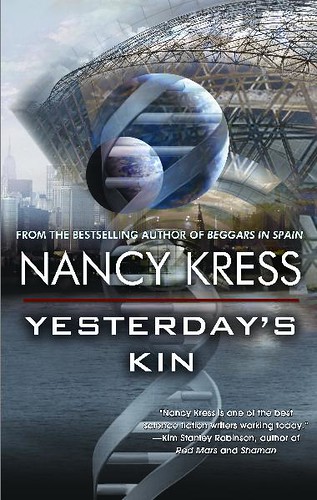 |
| Cover art by Thomas Canty |
So when I was called upon to copy edit the new, forthcoming novella, Yesterday's Kin , I knew that I would be working on another potential award-winning story. The author is, after all, Nancy Kress!
, I knew that I would be working on another potential award-winning story. The author is, after all, Nancy Kress!
The difficulty I'm having in sharing details of this story is due to the fact that nearly anything I say about Yesterday's Kin will be a spoiler. It's that kind of story: right up in your face from the very first section. And trust me, that's a good thing.
So what I'm going to do is share with you first the advertising copy that Tachyon Publications is using for this novella. That's not to say there aren't spoilers here, but at least it's what the publisher and author are willing to release about the story line:
Aliens have landed in New York.
A deadly cloud of spores has already infected and killed the inhabitants of two worlds. Now that plague is heading for Earth, and threatens humans and aliens alike. Can either species be trusted to find the cure?
Geneticist Marianne Jenner is immersed in the desperate race to save humanity, yet her family is tearing itself apart. Siblings Elizabeth and Ryan are strident isolationists who agree only that an alien conspiracy is in play. Marianne's youngest, Noah, is a loner addicted to a drug that constantly changes his identity. But between the four Jenners, the course of human history will be forever altered.
Earth's most elite scientists have ten months to prevent human extinction—and not everyone is willing to wait.
The story is told from two alternating points-of-view, that of geneticist Marianne Jenner, and her youngest son Noah. Marianne is living in the lab, night and day, working with a team of scientists to try to find a cure for, or at least a vaccine against, the deadly spores. Noah, on the other hand, is less -- and more -- than what he initially appears to be. While Marianne seeks a cure, Noah seeks out the aliens. And what of these aliens? Many believe the "Denebs" have arrived on Earth merely to use humans as guinea pigs; Marianne and her fellow scientists trust the aliens, but there is a limit to that trust because the Denebs are not very forthcoming with their own research on the spores.
Here's a very brief excerpt from the story:
A spore cloud doesn't look like anything at all.
A darker patch in dark space, or the slightest of veils barely dimming starlight shining behind it. Earth's astronomers could not accurately say how large it was, or how deep. They relied on Deneb measurements, except for the one fact that mattered most, which human satellites in deep space and human ingenuity at a hundred observatories was able to verify: The cloud was coming. The path of its closest edge would intersect Earth's path through space at the time the Denebs had said: early September.
Marianne knew that almost immediately following the UN announcement, madness and stupidity raged across the planet. Shelters were dug or sold or built, none of which would be effective. If air could get in, so could spores. In Kentucky, some company began equipping deep caves with air circulation, food for a year, and high-priced sleeping berths: reverting to Paleolithic caveman. She paid no more attention to this entrepreneurial survivalism than to the televised protests, destructive mobs, peaceful marches, or lurid artist depictions of the cloud and its presumed effects. She had a job to do.
Yesterday's Kin will be published by Tachyon Publications in September; the book is available now for preorder.
will be published by Tachyon Publications in September; the book is available now for preorder.

No comments:
Post a Comment